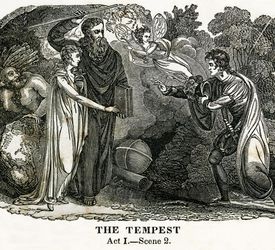
The ship is in the midst of a storm; the crew and passengers desperately cling on as the waves crash against the vessel. The King of Naples and his entourage are on board, their lives are at the mercy of the tempest. So, The Tempest is a commentary on the relationship between technology and freedom, as it shows that while technology can bring great benefits and power, it also has its limitations and can limit our freedom. Similar to Shoshana Zuboff’s work on the surveillance economy, she argues that technology can both enhance and restrict our freedom, depending on how it is used.
In Act I, Scene 2, Prospero explains to Miranda how he came to be the ruler of the island. In this scene, Prospero describes how he used his magic to subdue Caliban and Ariel, who were originally the rulers of the island, and how he now uses his power over them to maintain control. Prospero’s mastery over Caliban and Ariel can be seen as a parallel for the power and control that technology companies have over the information and data of individuals. Just as Prospero uses his magic to manipulate and control Caliban and Ariel, technology companies use algorithms and data analysis to manipulate and control their users. In The Psychology of Totalitarianism by Mattias Desmet, he argued: “that the “individual soul” in the masses is completely taken over by the “group soul” (85). Caliban and Ariel are seen as a group soul, not being able to make individual decisions. Through Prospero’s rule, he has completely taken away Caliban and Ariel’s ability to rationally think and critically challenge.
Thomas Kuhn’s idea of a “paradigm” refers to the shared set of beliefs, values, and assumptions that underlie scientific research and experimentation (2:30). Furthermore, Kuhn argues that scientific control and manipulation may not always reflect objective reality or truth because it is a product of cultural and individual subjectivity. The dominant beliefs, values, and assumptions (paradigms) that underlie a scientific paradigm shape how research is conducted, the questions that are asked, and the conclusions that are drawn. In The Tempest, Prospero’s use of magic is not solely driven by an objective pursuit of truth and reality. Instead, his magic is shaped by his own individual perspectives, experiences, and biases. Specifically, Prospero uses his magic for revenge against his brother, Antonio, who has wronged him.
This idea of scientific research and experimentation shaped by experiences and biases is not just limited to the scientific community. Modern technology companies embody this idea perfectly. The use of technology by companies- like Apple, Microsoft, Meta, and Prospero- is shaped by the values, goals, and motivations of the individuals and organizations behind it. Using Google as the prime example, Zuboff states “Google invented and perfected surveillance capitalism in much the same way that a century ago
General Motors invented and perfected managerial capitalism” (15). How Google operates treats personal data as a commodity that is bought and sold over a marketplace. This ideology exploits individuals’ personal information and creates the “behavioral surplus” (48) that Zuboff talks about.
One reply on “Prospero’s Invisible Hand”
This is absolutely wonderful!